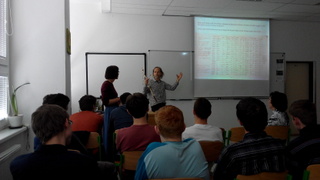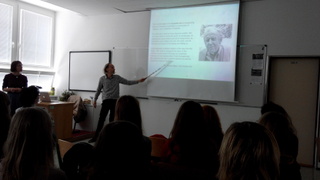Profesor Michael Northcott z univerzity v Edinburghu na Bigy

přednesl přednášku v angličtině na téma : The Political Theology of Climate Change.
Michael Northcott je profesorem etiky na univerzitě v Edinburghu ( Velká Británie, Skotsko). Hlavními oblastmi jeho odborné činnosti jsou ekonomie a etika, křetanská etika , ekologie a náboženská etika. Je hostujícím profesorem na několika univerzitách v Evropě, Americe a Asii. Vydal dvanáct odborných knih např. : Etika globálního oteplování, Politická teologie klimatické změny, Životní prostředí a křesťanská etika...Zabývá se výzkumem ve vztahu mezi etikou, ekologií a náboženstvím.
U nás ve škole přednesl přednášku v angličtině na téma : The Political Theology of Climate Change. Přednášku překládala pani Ilona Mužátková. Téma bylo velmi zajímavé a otevřelo nám nový pohled na ekologii ve vztahu s celosvětovou ekonomikou i globálními problémy lidstva. Pan profesor nám v závěrečné diskusi poradil, jak i my sami můžeme svým chováním a životními postoji přispět k lepšímu světu s pokorou před Božím stvořením. Studenti 2.B a sexty


The Political Theology of Climate Change
Scientists argue we are living in a new geological epoch - the ‘Anthropocene’ - because of the growing extent of human influence on the climate, the earth, and the evolution of species. Theologians from the nineteenth century have similarly argued that humans are growing in their influence over the earth. The growth of this influence offers humanity a fundamental politico-theological choice. On the one hand humans could restrain their impacts on the earth, reduce dependence on fossil fuels, and other extractive processes. On the other they could go to war with the sun - arming the atmosphere through geoengineering and so reducing solar insolation and temperature rise while continuing growth in consumption of fossil fuels, stripping of forests, soil erosion and so on. The United Nations Framework Convention on Climate Change is the only international treaty relating to reducing greenhouse gas emissions but it is not working. This is because national greenhouse gas emissions are the wrong target. Emissions are not the driving force of climate change but fossil fuel extraction. Once fossil fuels are extracted from sovereign territories they will be marketed and burned. But sovereign nations will not give up rights to license fossil fuel extraction because for the last one hundred years they were the dominant source of national wealth. Hence the geopolitics of fossil fuel energy remains fundamental to political events in East and West Europe as well as the relationship of fossil fuel owning nations, the planet and the sun. The Christian theopolitics posits two foundational alternatives for the politics of the earth and the 'Anthropocene'. One is the teaching on Just War and the related International Relations concept of Christian Realism where citizens, and even nations, are 'restrained' by an overarching katechon from a crescendo of conflict and evil. The other is the theopolitcs of the Good Shepherd who befriends even his enemy Judas, and the Good Samaritan and becomes a neighbour to a Jew who has been injured on the road. This theopolitical choice is made all the more urgent by neoliberalism which increasingly denies that people belong and have property rights in their own place, or even in a habitable earth and a future for their grandchildren. This is why faith communities and others who are finding ways to reclaim a local kind of earthly 'belonging' are a valuable messianic example of the theopolitics of the Good Shepherd. The alternative is to go to war with the sun, and for the nations who suffer the worst consequences to be restrained from migrating to the winners in this interstellar war.


